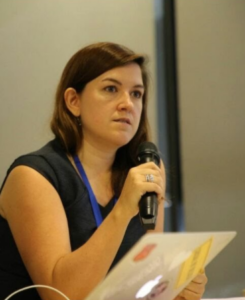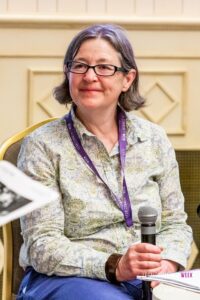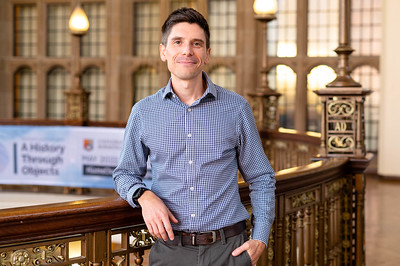Hosted by Bonavero Institute of Human Rights and the Centre for Freedom of the Media
May 3 2024
13:00-15:00
Strategic Lawsuits against Public Participation (SLAPPs) present a threat to media freedom in the United Kingdom (UK) as wealthy individuals and corporations improperly use the courts to silence journalists undertaking investigations. SLAPP claims are typically brought under the guise of defamation claims, but other areas of law, such as issues concerning data protection and privacy can also be used. SLAPP claims have been particularly attractive in the UK because the high costs of libel cases can financially exhaust a journalist or an organisation representing them (i.e. their publishing house). Additionally, the burden of proof in defamation cases rests on the defendant to prove that their statement is true and cases go on for a lengthy period of time which emotionally exhausts journalists.
The UK Government has responded to concerns surrounding SLAPPs and there is also cross-party support to deal with the problem of SLAPPs. The Economic Crime and Corporate Transparency Act 2023 saw the introduction of amendments to tackle SLAPPs, including an early dismissal mechanism and the protection of reporting on economic crimes. However, concerns have been raised that these do not address all of the problems SLAPPs pose. The amendment raises concerns through its introduction of a subjective test to determine the intent of the filer and does not completely address the concerns surrounding the costs of SLAPPs or providing exemplary damages for those who win their case alongside full recovery of their costs.
To mark World Press Freedom Day, the Bonavero Institute of Human Rights and the Centre for Freedom of the Media (CFOM) are hosting two panel events focusing on the threats that SLAPPs pose. The first panel event focuses on the chilling effects that SLAPPs can have on journalists/ism. The second panel focuses on how SLAPPs can be tackled through legislation, focusing on legislative efforts in the UK and also abroad.
Panel One Speakers
- Susan Coughtrie – Director of the Foreign Policy Centre and co-founder of the UK Anti-SLAPP Coalition
- Gill Phillips – lawyer who works as an editorial legal consultant for a number of NGOs and not for profits, advising on a range of content-related matters including defamation, privacy, contempt of court and reporting restrictions.
- Michelle Stanistreet – General Secretary of the National Union of Journalists (NUJ)
- Sayra Tekin – Director of Legal, policy and regulatory affairs for the News Media Association
Panel Two Speakers
- Dr Peter Coe – Associate Professor at Birmingham Law School and independent member of the Council of Europe’s Expert Committee on Strategic Lawsuits against Public Participation (SLAPPs)
- Charlie Holt – European Head of Global Climate Legal Defence (CliDef)
- Dr Rebecca Moosavian – Associate Professor in Law at University of Leeds School of Law
- Professor Paul Wragg – Professor of Media Law at University of Leeds School of Law
Registration for the event will open shortly. If you would like to be notified when registration opens, please click the button below. If you have any questions, please email gemma.horton@sheffield.ac.uk.
Speakers
Panel One

Susan Coughtrie has been the Director of the Foreign Policy Centre, an international affairs think tank, since January 2023. Susan joined FPC in 2020 to lead the Unsafe for Scrutiny project, which examines risks and threats to journalists investigating financial crime and corruption. The findings of this research led Susan to co-found the UK Anti-SLAPP Coalition in January 2021, which she continues to co-chair. Susan is also a member of the UK Government SLAPPs Taskforce. Susan has previously undertaken a variety of consultancy work in the media sphere, having previously worked at the international free expression organisation ARTICLE 19 from 2012-2018, and as an advisor to the European Centre for Press and Media Freedom (ECPMF) from 2019-2022.

Gill Phillips is a lawyer who works as an editorial legal consultant for a number of NGOs and not for profits, advising on a range of content-related matters including defamation, privacy, contempt of court and reporting restrictions. For over 10 years she was the Director of Editorial Legal Services at Guardian News and Media. In that capacity she was involved in the Trafigura super injunction case, and has advised GNM publications on Wikileaks, Edward Snowden, and various big data leak stories such as the Panama and Paradise Papers. She is the co-author (along with Sian Harrison) of the 27th edition of McNae’s Essential Law for Journalists, due out Summer 2024. She also sits as a part-time Employment Tribunal Judge and co-authors the University of Law Employment Law handbook.

Michelle Stanistreet worked as a journalist for 10 years at the Sunday Express newspaper as feature writer and books editor. Under her leadership of the NUJ she has championed quality journalism and the role of public interest journalism and public service broadcasting as vital to a democratic society. The union robustly defends freedom of the press, successfully representing Chris Mullin at the Old Bailey when he refused to reveal his sources to the West Midlands Police. She also supported BBC presenter Samira Ahmed during her landmark unequal pay case.

Sayra Tekin is director of legal, policy and regulatory affairs for the News Media Association. With a wealth of experience in media law and litigation, she is responsible for the NMA committee, chaired by Lord Black, comprising publisher and editorial representatives and legal and policy experts. Formerly at the BBC, she is an experienced solicitor-advocate with a strong track record for advising journalists and editors and successfully lobbying courts and regulators on issues which threaten press freedom. She has advised on sensitive parliamentary select committee investigations and high-profile public inquiries. Prior to the BBC, Sayra was a dispute resolution specialist at Slaughter and May where she also trained. Sayra currently sits on the Government SLAPPs Taskforce and is co-authoring the practitioner’s textbook, Media Law and Regulation, for Bloomsbury due to be published in 2025.
Panel Two

Pete Coe is an Associate Professor in Law at Birmingham Law School, University of Birmingham, an IAS Fellow at Durham University, a Senior Visiting Research Fellow at the School of Law, University of Reading, and an Associate Research Fellow at the Institute of Advanced Legal Studies and Information Law and Policy Centre, University of London. His research interests fall within the broad field of Media Law. In 2022 he was appointed by the Council of Europe as an independent member of the Council’s Expert Committee on SLAPPs. As a member of the Committee, he contributed to the recently approved Recommendation on countering the use of SLAPPs. Additionally, his work on citizen journalism, press freedom and regulation led to him being invited to join the Impress Code Committee to support its review of its Standards Code for journalists, and between October 2021 and January 2022 he was engaged by Impress to draft its new Standards Code. During 2021-2022, upon invitation from the International Academy of Comparative Law and British Association of Comparative Law, Pete acted as the UK’s National Rapporteur on Freedom of Speech and the Regulation of Fake News. As well as publishing in leading journals, Pete’s monograph, Media Freedom in the Age of Citizen Journalism, was published by Edward Elgar in 2021. He is the co-editor, with Professor Paul Wragg, of Landmark Cases in Privacy Law, which was published by Hart in 2023, and the co-author, with Rebecca Moosavian, of Principles of Defamation Law, which will be published by Edward Elgar in 2025.

Charlie Holt is the European Head of Global Climate Legal Defence (CliDef), an organisation set up to support climate activists facing SLAPPs and other legal threats. He also advises on legal strategy for Greenpeace International, where he leads the organisation’s SLAPP resilience strategy and sits on the European Commission’s Expert Group on SLAPPs. He sits on the Steering Committee of the Coalition Against SLAPPs in Europe (CASE) and co-chairs the UK Working Group on SLAPPs. Since 2016, Charlie has advised on the response of Greenpeace International to two aggressive large-scale SLAPPs targeting Greenpeace entities in the USA, and in 2018 helped to set up the US anti-SLAPP coalition Protect the Protest.

Rebecca Moosavian is an Associate Professor at the University of Leeds School of Law. Her research crosses media law and intellectual property with a particular focus on privacy and free expression. In recent years her publications have investigated legal regulation of the individual’s image. Rebecca also has expertise in constitutional law and has published works on the Iraq war and the Covid-19 lockdown measures. She has acted as co-convenor for the Society of Legal Scholars jurisprudence stream and is currently a member of the Socio-Legal Studies Association (SLSA) executive board and chair of the SLSA Grants sub-committee.

Paul Wragg is Professor of Media Law at the University of Leeds. He specialises in press freedom and free speech theory, especially as it relates to privacy, press regulation, and speech rights in the workplace. His monograph, A Free and Regulated Press was published by Hart in 2020, and his work has appeared in leading journals in the UK and internationally. He is a director of the campaign group, Hacked Off and a former (original) code committee member at Impress, the UK’s only independently recognised press regulator
